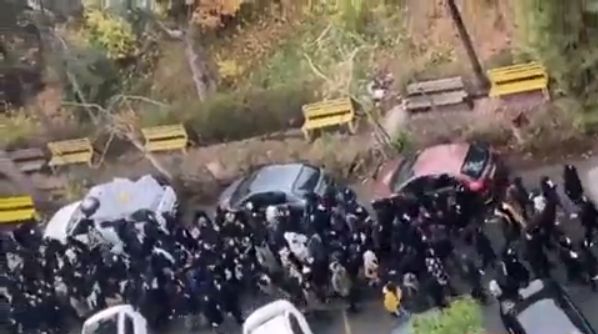Re-posted from Shahrokh Zamani Action Campaign
Almost three months on since the state murder of Mahsa (Jina) Amini, the Iranian regime is still struggling to contain one of the most significant and sustained protest movements in its history.
With the vast majority of the population opposed to the regime, and tens of thousands prepared to protest against it every night, a number of students’ organisations called for three days of action on 14-16 Azar (December 5-7). A ‘call to arms’ was issued, urging wide participation from all sections of society, ending on 16 Azar – Student Day*.
Although many students’ organisations and teachers’ associations boycotted university and school classes, and lorry owners and drivers showed solid support for the strike call, there were no significant groups of workers who went on strike in response to this call.
Shop owners in many cities and towns also joined the action, keeping their shops closed. But the commercial strike was not as widespread as had been expected, probably due to reprisals by the regime (with shops that did not open for business being sealed off).
There are now several strands of strikes and protests in Iran: nightly street protests by women and young people against the hejab and for democratic rights; the struggles of the oppressed Baluchi people against the regime’s brutal repression (which goes largely unreported because of killings, arrests and internet shutdowns); the struggles of the Kurdish people against national oppression and medieval sieges against their cities and towns; the protests at the funerals of demonstrators (or commemorations of the fortieth day of their death); students’ boycotts and action inside universities; strikes and other types of action by teachers’ associations and the numerous strikes by industrial workers in many sectors.
It is the last category, action by industrial workers, that is the key to how the tug-of-war between the most reactionary form of capitalist dictatorship and the militant masses ends. The absence of a central leadership of the working class, which can unite its strikes and struggles and also provide all other exploited and oppressed layers in society with guidance and direction in their struggles against this blood-soaked regime, is becoming more and more palpable. Every day the human cost of this lack of independent and revolutionary class leadership becomes higher. The workers and masses are brave but they lack the leadership that will give them the tactics, strategy and organisation that can make a decisive breakthrough against this dictatorship and the reactionary class forces it represents.
Shahrokh Zamani Action Campaign
9 December 2022
* Student Day in Iran: a day of remembrance and struggle
On 6 December 1953 (16 Azar 1332) students at Tehran University organised a demonstration against Richard Nixon’s visit. The US vice president was visiting Tehran less than four months after a CIA coup that had overthrown Dr Mohammad Mossadegh and brought the Shah back to power. This was at the height of the Cold War and the August 1953 coup d’état in Iran was later used as a blueprint for many other CIA coups throughout the world – beginning with the overthrow of Jacobo Arbenz in Guatemala just 10 months later.
At a time when anti-American feelings were running high and the Shah had not totally crushed all opposition, a visit by Nixon, one of McCarthy’s henchmen, to one of the USSR’s main southern neighbours was clearly calculated to show full US support for the monarchist regime. When Tehran University’s students demonstrated against Nixon’s presence in Iran the Shah’s ‘Immortal Guard’ entered the university compound and brutally attacked them. They shot dead three of the students.
Since then, every year 16 Azar (which usually falls on December 6) has been commemorated as a symbol of Iranian students’ struggle against dictatorship and for social justice. This year’s protests honouring Student Day (December 7) included a rally at Allameh Tabataba’i University in Tehran. Despite the presence of the security forces, the students’ slogans included the following:
‘Bread, work, freedom, optional [hejab] covering’
‘Students, workers, unite, unite’
‘The students are awake and hate tyranny’
‘We’re the workers’ children, we stand with them’
‘We don’t want security [i.e., militarised] university’.



